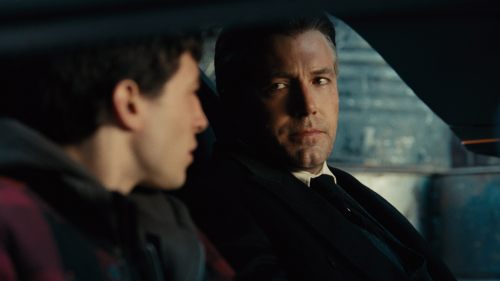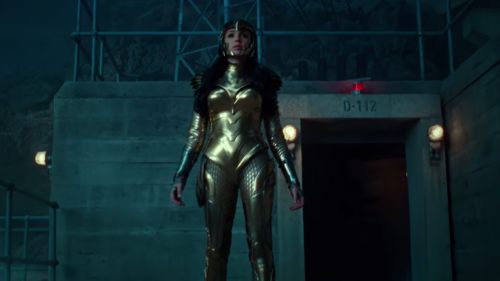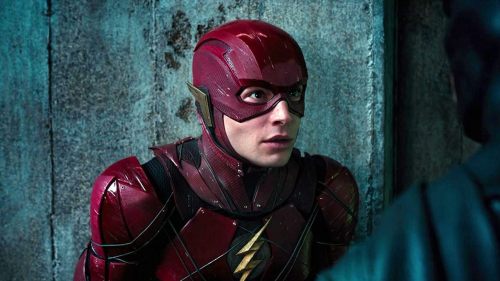WONDER WOMAN: DC Finally Gets It Right
Ever since I started running around Los Angeles screaming about how great Patty Jenkins’ Wonder Woman film is, I’ve gotten the same question over and over again: “Are you sure?” Is it safe? Such is the level of mistrust and antipathy directed at WB and DC by a segment of fandom. It’s just too difficult to fathom that they got it right this time.
I’m here to assure you, yet again, that they did.
Wonder Woman is unquestionably the best DC superhero film since The Dark Knight, dispensing with the relentlessly grim, cynical take on these iconic characters in favor of embracing an appropriately modern interpretation of the aw shucks sincerity that defined the times in which these heroes were born. Gal Gadot performs the niftiest trick in superhero cinema, playing the origin story of a character she’s already introduced in another film. Diana Prince is not the highly confident person challenging Bruce Wayne in Batman v Superman: Dawn of Justice, a film Gadot thoroughly stole from the bigger names in the cast. Instead, she plays Diana’s strength, plus the vulnerable, optimistic, moral core that was missing from that initial performance.
What defines her is her capacity for compassion and steadfast belief that despite humanity’s many flaws, it’s still worth saving. One can’t help but daydream about how Wonder Woman would respond to the childish, myopic protests against female-only screenings of this movie. Surely, her reaction would be something more evolved than what us mere mortals can come up with today, and that’s the beauty of the DC characters. The Marvel canon is full of flawed humans — alcoholics, narcissists, callow teenagers, and morally conflicted vigilantes. The appeal is that they resemble us. The DC heroes are better than us. They light the way to a more perfect tomorrow, which is historically why grumpy, mortal Batman is the outsider of the Justice League. Wonder Woman is earnest, when so many cinematic superheroes are either moody or perpetually glib. She believes in old-timey virtues like love, honor, and kindness. These are classic hero tropes that looked like they’d fully gone out of style in the wake of the one-two punch of Dark Knight and Iron Man back in 2008, but if there’s ever going to be a moment when the world needs a few more depictions of unsullied goodness on screen, this is it.
Wonder Woman is not a perfect film, but neither is Richard Donner’s Superman: The Movie, which is still considered the gold standard of the genre almost 40 years later. It shares with that movie a breezy charm, a lack of undue pretention, and a commitment to emotional honesty that’s sometimes lacking in the superhero picture. The romance between Diana and love interest Steve Trevor (the absolutely fantastic Chris Pine) is one of the most fully realized love stories we’ve seen out of a comic book film in decades. Their chemistry is effortless, their banter is as witty as anything out of a Marvel film, and where we leave them at the end of the film is more affecting than you’d expect.
Wonder Woman opens, as Donner’s Superman does, with an extended sequence in a magical utopia unknown to humankind. Highly accomplished actors (Robin Wright and Connie Nielsen, in this instance) strap into exotic uniforms and speak in haughty, whispered tones as they dump their gilded exposition. Nielsen’s Queen Hippolyta and Wright’s General Antiope are dueling mentors for young Diana of Themyscira. Hippolyta, her mother, preaches restraint. She tries to keep her daughter from training to be an Amazon warrior and discourages her from running off to the world of man with Steve Trevor. Antiope, on the other hand, is an idealistic interventionist who secretly teaches Diana how to fight and reminds her of her duty to defend humanity from the God of War, Ares, whom they believe is behind the carnage of World War I.
It’s the slowest, most trying part of the film, by far. Where Superman: The Movie blows up Krypton as quickly as they possibly can and moves us on to the bucolic Kansas tableaus and folksy wisdom of the Kents, Wonder Woman lingers in Themyscira, with all of the stuffy trappings that come with it. Wright is suitably badass and produces the first fist-pumping applause break moment in the film, but these scenes mostly suffer from the same plodding feeling that weighed down the first two Thor movies. Once the action shifts to London, the film finds its footing, but these early scenes are necessary to get us to the magnificent payoff. The conflict between Antiope and Hippolyta and their opposing worldviews mirrors the American debate during the actual War to End All Wars and informs the character arc of Diana Prince as she tries to find her way in a world she barely understands.
Adult Diana meets Steve Trevor and isn’t smitten with his good looks or chiseled physique. She doesn’t run off with him to go fight the Germans because he’s so impossibly handsome. They click because he shares with her an intrinsic need to do the right thing, to stand up to injustice, and to give more than you take. Again, it all sounds so hokey, but haven’t we deconstructed superheroes enough? It’s like redoing an autopsy on a dead body — the more you cut it up, the less it resembles the thing you started working on in the first place. If you are hoping for Granny’s Peach Tea and villains getting their necks snapped to the strains of an electric guitar, you’re out of luck.
The villains here are not scene-chewers, either. Danny Huston plays General Ludendorff, an ambitious German officer who Diana believes is Ares in disguise. Spanish actress Elena Anaya is his loyal confidant, Doctor Maru, aka Doctor Poison — a character plucked from the pages of Wonder Woman back issues. Like most successful origin stories, the story doesn’t linger too long on the antagonists. The major outliers being Donner’s Superman, which gives up large stretches of screen-time to Gene Hackman’s two-man comedy routine with Ned Beatty, and the first Burton Batman. Spider-Man, Batman Begins, Iron Man, Guardians of the Galaxy, and others make sure their villains serve the purpose of illuminating something about the heroes (or just marginalizing them ever so slightly, so as not to complicate the narrative), which Wonder Woman does quite well.
Some will take the creative success of Wonder Woman as a rebuke to Zack Snyder’s vision for the DC cinematic universe. They’re likely the same people who’d rather celebrate his exit from Justice League than to empathize with the significant, unfathomable loss of his daughter. There’s still plenty of his fingerprints on this film, from his story credit and the way it ties into the greater DC storyline with a modern-day framing device to the highly stylized action scenes that don’t stray very far from the template established in the previous films. There’s plenty of slow-motion fighting amongst the realistic depictions of trench warfare. The “living comic book panel” vision of Snyder and his penchant for third act climaxes taking place in the dark, with random fires erupting everywhere, are present and accounted for. What Patty Jenkins is able to do with all of that is ground it in emotion and character, to make audiences smile and walk out of the theater feeling uplifted rather than exhausted. It’s the movie we’ve been waiting for. Trust me.



